*** Proof of Product ***
Exploring the Essential Features of “Pavel Somov – 2-Day Intensive Training: Shame, Guilt and Self-Criticism Course”
Description
There’s no better feeling than providing relief from suffering. From the chronically stressed, to those grappling with trauma, dysfunctional relationships with food, substance use issues or anger — you love the fulfillment of making a difference.
But shame, guilt, and self-criticism play a critical role in these problems and can dramatically disrupt therapy. You worry that you’ll fail to convince clients who feel unworthy that they deserve a better life. And you’re left frustrated, drained and unsure what will move therapy forward when fears about failure and inadequacy create a state of paralysis in shame-driven and self-critical clients.
This recording will give you the skills and tools you need to end the tyrannical hold of shame, guilt and self-criticism and empower your clients to develop the acceptance of themselves, others and reality necessary for the effective treatment of trauma, stress, anxiety, depression, binge eating, substance use, and anger issues.
Experience the satisfaction of greater therapeutic success when you can help clients release unhealthy shame and cultivate the self-acceptance they need to move toward a brighter future!
Speaker
Pavel Somov Somov, PhD
Licensed Psychologist and Self-Help author
Private Practice
Objectives
- Characterize how shame, guilt, and apathy can function as impediments to clinical progress.
- Establish how clinicians can teach clients techniques to negate the sweeping generalizations that can lie behind shame.
- Discriminate guilt from regret and communicate how this informs therapeutic approach.
- Communicate how normalizing strategies can be used with clients to dissipate self-doubt.
- Articulate how Choice Awareness Training can be used in therapy to combat motivational apathy.
- Specify how techniques that reframe symptoms as strengths can be used to increase therapeutic effectiveness with self-critical clients.
- Assess the impact of exposure and mindfulness interventions on affect avoidance.
- Establish how exercises that help clients rediscover their self-worth can be used in trauma treatment.
- Communicate how shame pushes clients into binge eating and clarify how self-acceptance interventions can be used to reduce emotional eating.
- Determine how shame acts as a cover for anger and explain how compassion exercises can be employed to help clients let go of anger.
- Analyze research that establishes shame as a risk factor for suicide in depressed individuals.
- Address the importance of managing shame in clients with substance use issues in efforts to prevent relapse.
Outline
Shame, Guilt and Motivational Apathy as Impediments to Clinical Progress
- Therapy as a trigger and affect avoidance
- Clinical impasses (underutilization, stagnation, premature termination)
- Shame, guilt and a sense of not-deserving
- Secrets from self and from therapist
Tools for Catalyzing Progress in Therapy
- Normalizing, de-pathologizing, un-diagnosing
- Dialectic reframing & evolutionary psychology
- Mindfulness & metacognition
- Self-acceptance & self-compassion
- Neuroplasticity of internalization
Shame: Clinical Techniques to Move Therapy Forward
- Debunking the myth of self-sabotage
- Manage outside judgement with a self-referenced identity
- Techniques to negate sweeping generalizations
- Foster self-forgiveness with motivational innocence
Guilt: Help Clients Overcome the Debts of Guilt
- Differentiate guilt from regret
- Ordinary perfection & self-acceptance
- Master the fear of making mistakes
Self-Doubt, Dilemmas & Indecision: Interventions for Clients Paralyzed by Uncertainty
- Normalizing strategies to dissipate self-doubt
- Manage the anxiety of unpredictability with uncertainty training
- Make decisions easier with the art of arbitrary choice
- Reframe a dilemma as a choice between two rights
Motivational Apathy & Self-Inefficacy: Strategies to Improve Motivation and Autonomy
- Find a reason-to-change with the change equation
- Techniques that leverage intrinsic motivation
- Find freedom-to-change with Choice Awareness Training (CAT)
- Pattern interruption for habit change – get clients off autopilot
Self-Criticism and Self-Stigmatization: Quiet Your Client’s Inner Critic
- Varieties of self-deprecation (self-criticism, self-loathing, etc.)
- Techniques to reframe symptoms as strengths
- Compassion exercises for problematic habits of self-care
- Recover from the disease model
Working through Affect Avoidance
- Exposure, mindfulness & metacognition
- Top-down & bottom-up emotional self-regulation
- Cue-conditioning of self-Regulation
Connect Specific Strategies to the Treatment of:
Trauma
- Damaged goods, survivor’s guilt & avoidance of conflict
- Somatic interventions to restore the original goodness
- Strategies to survive without guilt
- Conflict avoidance: Paper tigers v. real tigers
- Exercises to rediscover self-worth
Stress and Anxiety
- Mediate the paralysis of perfection with self-acceptance
- Non-neurotic, stress-free perfectionism
- Social anxiety as shame & self-doubt: disapproval inoculation & self-referencing
- Mindfulness-based, non-anxious self-consciousness
Emotional Eating & Binge Eating
- How shame pushes clients into binge eating
- Choice Awareness Training for moderation & presence
- Self-acceptance strategies for emotional eating
- Transcend body shame by dis-identifying from the physical
Anger
- Shame of fear: Shame as a cover for anger
- The vicious guilt-anger loop
- Self-acceptance techniques for internal damage control
- Compassion exercises to let go of anger
Depression
- Depression as self-exile
- Shame as a risk factor for suicide
- Mindfulness for managing rumination
- Metacognitive silence: From negative self-talk to selfaccepting non-talk
Substance Abuse
- Addressing the shame of relapse
- Self-assertive trigger avoidance
- Choice awareness techniques for habit modification
- Build craving/impulse control skill power
Betrayal, Secrecy & Deception
- Separation & divorce as self-care & progress
- Secrets from therapist without rupture of rapport
- De-pathologizing the motives behind lying & deception
Research, Limitations and Potential Risks
Target Audience
- Counselors
- Social Workers
- Psychologists
- Addictions Counselors
- Case Managers
- Marriage & Family Therapists
- Other Mental Health Professionals
- Chaplains/Clergy
Please see the full list of alternative group-buy courses available here: https://lunacourse.com/shop/

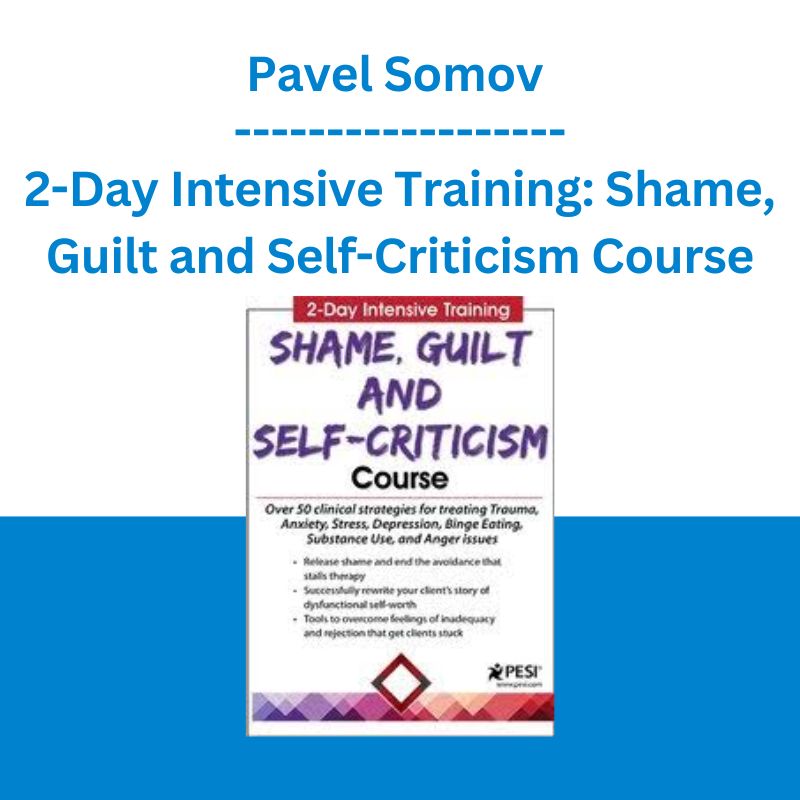








 Team NFT Money - Ultimate NFT Playbook
Team NFT Money - Ultimate NFT Playbook  Adam Lyons - Passion Engineering
Adam Lyons - Passion Engineering  Jesse Livermore Trading System - Joe Marwood
Jesse Livermore Trading System - Joe Marwood  Crypto Dan - The Crypto Investing Blueprint To Financial Freedom By 2025
Crypto Dan - The Crypto Investing Blueprint To Financial Freedom By 2025  Fred Haug - Virtual Wholesaling Simplified
Fred Haug - Virtual Wholesaling Simplified  Itzhak Beery - Shamanic Healing
Itzhak Beery - Shamanic Healing  Eyal Levi - Metal Drum Programming
Eyal Levi - Metal Drum Programming  Giorgio Tavazza & Valter Pascucci - Avanguardia Retail
Giorgio Tavazza & Valter Pascucci - Avanguardia Retail  Charles Geisst - The Last Partnerships. Inside the Great Wall Street Dynasties
Charles Geisst - The Last Partnerships. Inside the Great Wall Street Dynasties  Julie Stoian & Cathy Olson - Launch Gorgeous - Funnel Gorgeous Bundle
Julie Stoian & Cathy Olson - Launch Gorgeous - Funnel Gorgeous Bundle  Ellen Bendremer - Top Telemarketing Techniques: Use Your Voice and Emotions to Make the Sale
Ellen Bendremer - Top Telemarketing Techniques: Use Your Voice and Emotions to Make the Sale  Martin Rutte - Project Heaven on Earth - The Shift Network
Martin Rutte - Project Heaven on Earth - The Shift Network  Alphashark - The AlphaShark SV-Scalper
Alphashark - The AlphaShark SV-Scalper  Akeem Reed - Slingshot Rental Blueprint
Akeem Reed - Slingshot Rental Blueprint  The Daily Traders – Exclusive Trading Mentorship Group
The Daily Traders – Exclusive Trading Mentorship Group 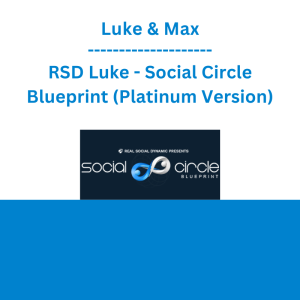 Luke & Max - RSD Luke - Social Circle Blueprint (Platinum Version)
Luke & Max - RSD Luke - Social Circle Blueprint (Platinum Version)  Chad Hensel - Pharmacology for the Rehabilitation Professional: Countering Side Effects & Dangerous Reactions to Promote Better Outcomes - PESI
Chad Hensel - Pharmacology for the Rehabilitation Professional: Countering Side Effects & Dangerous Reactions to Promote Better Outcomes - PESI  Jerry Banfield with EDUfyre - The Airbnb Experiences Course!
Jerry Banfield with EDUfyre - The Airbnb Experiences Course!  Joey Yap - Completed Bazi Collection
Joey Yap - Completed Bazi Collection  Kenrick Cleveland - M.O.M. 3.0
Kenrick Cleveland - M.O.M. 3.0  The Rock House Method - Learn Rock Guitar
The Rock House Method - Learn Rock Guitar  CC05 Keynote 04 - The Revolution in Couples Therapy - Susan Johnson
CC05 Keynote 04 - The Revolution in Couples Therapy - Susan Johnson  George Fontanills & Tom Gentile - Optionetics Wealth Without Worry Course
George Fontanills & Tom Gentile - Optionetics Wealth Without Worry Course  Tele-Summit Secrets - Milana Leshinsky
Tele-Summit Secrets - Milana Leshinsky 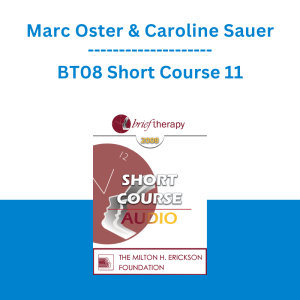 Marc Oster & Caroline Sauer - BT08 Short Course 11 - Mind-Body Brief Therapy Solutions for Body-Dysmorphia in Post-Surgery Bariatric Patients
Marc Oster & Caroline Sauer - BT08 Short Course 11 - Mind-Body Brief Therapy Solutions for Body-Dysmorphia in Post-Surgery Bariatric Patients  Lynk Trading - WillssFX 2022
Lynk Trading - WillssFX 2022  Oliver Velez - Essential Strategy Of Trade For Life
Oliver Velez - Essential Strategy Of Trade For Life  Thomas Szasz - EP90 Workshop 09 - Conversation with an Officially Denominated "Schizophrenic" Patient
Thomas Szasz - EP90 Workshop 09 - Conversation with an Officially Denominated "Schizophrenic" Patient  George Fontanills & Tom Gentile - Optionetics 6 DVD Series Home Study Course (Digital Download)
George Fontanills & Tom Gentile - Optionetics 6 DVD Series Home Study Course (Digital Download)  Matan Feldman - The 13-Week Cash Flow Modeling - Wall Street Prep
Matan Feldman - The 13-Week Cash Flow Modeling - Wall Street Prep  The Ultimate Black Friday Bundle 2022
The Ultimate Black Friday Bundle 2022  Martin Seligman - EP09 Invited Address 07 - Advances in Positive Psychology
Martin Seligman - EP09 Invited Address 07 - Advances in Positive Psychology  Vinh Giang - Stage Academy 2024
Vinh Giang - Stage Academy 2024  Al Brooks - Trading Price Action Reversals
Al Brooks - Trading Price Action Reversals  Tal Shmueliand & Eyal Yassky - Growing Your Business With Startup Strategies
Tal Shmueliand & Eyal Yassky - Growing Your Business With Startup Strategies  Janina Fisher, Esther Perel & Terry Real - Healing Trauma in Relationships: Expert approaches to overcome attachment wounds, shame, betrayal, and more - PESI
Janina Fisher, Esther Perel & Terry Real - Healing Trauma in Relationships: Expert approaches to overcome attachment wounds, shame, betrayal, and more - PESI  Greg Loehr - Advanced Option Trading With Broken Wing Butterflies
Greg Loehr - Advanced Option Trading With Broken Wing Butterflies  Mr. Leonardo – Tradingoptionslive - Trade Like A Rockstar Course
Mr. Leonardo – Tradingoptionslive - Trade Like A Rockstar Course  AMZ Trainer - Amazon Workshop
AMZ Trainer - Amazon Workshop  Emanuele Bonanni - My Trading Way
Emanuele Bonanni - My Trading Way  Shawn Bolz - God Secrets
Shawn Bolz - God Secrets  Zach Spuckler - The 5-Figure Challenge (DIY Level Experience)
Zach Spuckler - The 5-Figure Challenge (DIY Level Experience)  John Charnes - Financial Modeling with Crystal Ball & Excel (1st Edition)
John Charnes - Financial Modeling with Crystal Ball & Excel (1st Edition)  TheNotionTrader - Trading OS 2.0 - Automated Trading Journal for Notion
TheNotionTrader - Trading OS 2.0 - Automated Trading Journal for Notion  Perfecting the Headshot - Peter Hurley
Perfecting the Headshot - Peter Hurley  Forexmentor - Recurring Forex Patterns
Forexmentor - Recurring Forex Patterns  Trade Like Mike - The TLM Playbook 2022
Trade Like Mike - The TLM Playbook 2022 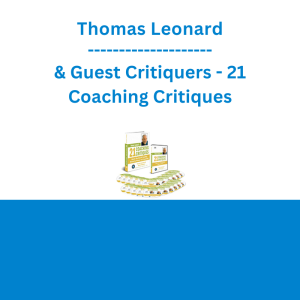 Thomas Leonard & Guest Critiquers - 21 Coaching Critiques
Thomas Leonard & Guest Critiquers - 21 Coaching Critiques  Nathan Duck - Blender 3D Master - EZCO
Nathan Duck - Blender 3D Master - EZCO  Eric Wombwell & Karen Marzlin - Pharmacology Treatment Regimens for Infectious Diseases and Complex Cardiovascular Disorders
Eric Wombwell & Karen Marzlin - Pharmacology Treatment Regimens for Infectious Diseases and Complex Cardiovascular Disorders 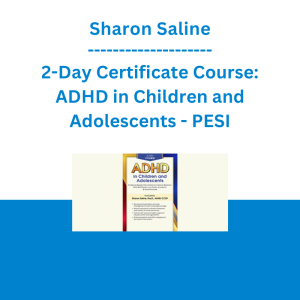 Sharon Saline - 2-Day Certificate Course: ADHD in Children and Adolescents: Evidence-Based Interventions to Improve Behavior, Build Self-Esteem and Foster Academic & Social Success - PESI
Sharon Saline - 2-Day Certificate Course: ADHD in Children and Adolescents: Evidence-Based Interventions to Improve Behavior, Build Self-Esteem and Foster Academic & Social Success - PESI  Complete EROS Program - Sexual Health for Men, Fix ED & PE
Complete EROS Program - Sexual Health for Men, Fix ED & PE  PRO EDU - Eero Aarnio: Ball Chair 3D Model
PRO EDU - Eero Aarnio: Ball Chair 3D Model 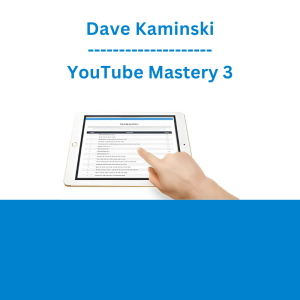 Dave Kaminski - YouTube Mastery 3
Dave Kaminski - YouTube Mastery 3  Kare Anderson - Find the Right Partners to Grow Your Business
Kare Anderson - Find the Right Partners to Grow Your Business  Trailer - The Eight Extraordinary Channels of Classical Chinese Medicine - Jeffrey Yuen
Trailer - The Eight Extraordinary Channels of Classical Chinese Medicine - Jeffrey Yuen  Shenja Jeworek - Design Thinking in 3 Steps
Shenja Jeworek - Design Thinking in 3 Steps  Using Lightroom to Fix Bad Lighting - Matt Kloskowski
Using Lightroom to Fix Bad Lighting - Matt Kloskowski  Yaron Seidman - Hunyuan Circle Theory
Yaron Seidman - Hunyuan Circle Theory  SMB - Options Training
SMB - Options Training  Matthew The Body Kemmetmueller - The Business of Volume School Photography
Matthew The Body Kemmetmueller - The Business of Volume School Photography  Vejas Gabriel Liulevicius - A History of Eastern Europe
Vejas Gabriel Liulevicius - A History of Eastern Europe  Darius Belejevas - The WOW-Factor
Darius Belejevas - The WOW-Factor  Hannah Harvey - The Art of Storytelling: From Parents to Professionals
Hannah Harvey - The Art of Storytelling: From Parents to Professionals  Don Pendleton - Cleveland Pipeline (The Executioner Book 30) (Kindle)
Don Pendleton - Cleveland Pipeline (The Executioner Book 30) (Kindle)  Jennifer Hadley - Be A Love Magnet
Jennifer Hadley - Be A Love Magnet  Jason Bond - The Basics of Swing Trading
Jason Bond - The Basics of Swing Trading 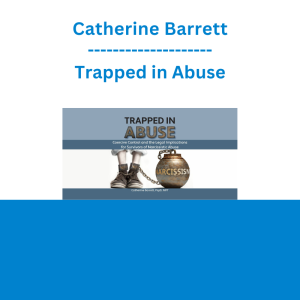 Catherine Barrett - Trapped in Abuse: Coercive Control and the Legal Implications for Survivors of Narcissistic Abuse
Catherine Barrett - Trapped in Abuse: Coercive Control and the Legal Implications for Survivors of Narcissistic Abuse  Amira Rahim - Better Than Art School
Amira Rahim - Better Than Art School  Carl Cestari - Goshinjutsu Judo
Carl Cestari - Goshinjutsu Judo  Hypnosis Bootcamp - 5 Course Bundle
Hypnosis Bootcamp - 5 Course Bundle  Lois Fenner - Legal & Ethical Issues in Behavioral Health in Florida - PESI
Lois Fenner - Legal & Ethical Issues in Behavioral Health in Florida - PESI 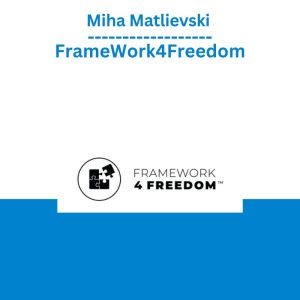 Miha Matlievski – FrameWork4Freedom
Miha Matlievski – FrameWork4Freedom  Jack Corsellis - Bundle 2021 Full Course
Jack Corsellis - Bundle 2021 Full Course  Sean Dalton - Complete Preset Bundle
Sean Dalton - Complete Preset Bundle  Jamshid Gharajedaghi - Systems Thinking (2nd Ed.)
Jamshid Gharajedaghi - Systems Thinking (2nd Ed.)  Motivational Interviewing: Eliciting Clients' Own Arguments for Change - William Matulich
Motivational Interviewing: Eliciting Clients' Own Arguments for Change - William Matulich  Hopes And Fears - Dr Peter Davies
Hopes And Fears - Dr Peter Davies  Dorsey Armstrong - The Black Death: New Lessons from Recent Research
Dorsey Armstrong - The Black Death: New Lessons from Recent Research  Marco Casario - Investire sulle Criptovalute (2020)
Marco Casario - Investire sulle Criptovalute (2020)  Pediatric Dysphagia: Establishing the Brain-Mouth-Gut Connection - Michelle Dawson - PESI
Pediatric Dysphagia: Establishing the Brain-Mouth-Gut Connection - Michelle Dawson - PESI